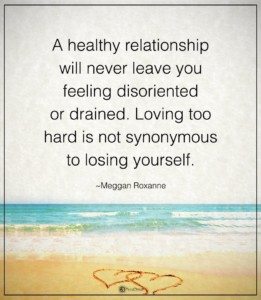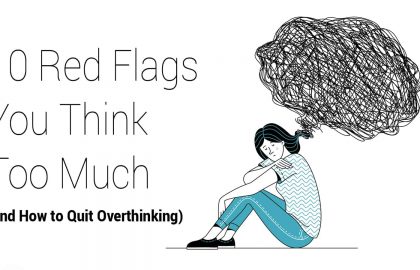There’s Clingy, and then there’s Codependent
Clinginess is different from codependency in that the former is much less extreme. Whereas a clingy person may “hang around” a bit too much, a codependent person believes that they can’t be alone. Their lives revolve around having the other person nearby all of the time.
A codependent individual must feel as if they are needed, even if it means leaning entirely into a person for physical, emotional, and mental well-being. Often, this exaggerated sense of neediness leads to the person compromising not only their self-esteem and self-worth but that of their partner as well.
The Effects of Codependency
A codependent relationship is characterized by “a person belonging to a dysfunctional, one-sided relationship where one person relies on the other for meeting nearly all of the emotional and self-esteem needs.” Psychologists often call the non-codependent person in a relationship the “enabler,” as they make it possible for the other to “maintain their irresponsible, addictive, or underachieving behavior.”
The other half of the relationship often reports feeling as if they are always expending energy. A highly dependent person always seems to need something – a behavior that drains their partner. As a result, the other person may feel as if they’re trapped; sacrificing their personal happiness to meet the codependent person’s insatiable needs.
5 Characteristics of a Codependent Relationship
“Codependency is an emotional and behavioral condition that affects an individual’s ability to have a healthy, mutually satisfying relationship. It is also known as ‘relationship addiction’ because people with codependency often form or maintain relationships that are one-sided, emotionally destructive and/or abusive.” ~ Mental Health America
1. Excessively Controlling Behavior
Most people are more comfortable knowing that they are in control of their own lives. But comfort is not the motivating reason behind a codependent person’s excessively controlling ways.
For codependents, sensing that they are in control – often manifesting as an overly-bossy demeanor – is a must. Without controlling those close to them, codependents are vulnerable to “unacceptable risks,” such as having to share their feelings.
2. Displaying Painful Emotions
Make no mistake: most codependent people have lived difficult lives. Here’s just a short list of reasons why codependency develops in a person:
– Parental abuse and neglect
– Caring for a seriously ill family member at a young age
– Exposure to drugs and alcohol abuse
As a result of early life experiences, the codependent person has a tough time managing stress, which leads to experiencing painful emotions. They may show anger and resentment, or develop chronic anxiety and depression. Physical abuse is not uncommon.
3. A Near Absence of Personal Boundaries
A codependent person finds it nearly impossible to respect boundaries. The reason for this is that they don’t understand them. Innately, most of us know that an “imaginary line” exists between what belongs to us and what belongs to others. For instance, few people would willingly barge into a co-workers cubicle during work. They certainly wouldn’t presume to possess the other person’s feelings, thoughts, and needs.
But then again, most people are not excessively insecure codependents. What makes this whole scenario ironic is that codependents themselves have super rigid boundaries, often closing themselves off and withdrawing.
4. Poor Self-Esteem on Both Sides
A codependent personality could not develop without a deficient sense of self-esteem. Think about it: codependency involves latching onto others for the fulfillment of most needs. A person in possession of even a moderate level of self-respect wouldn’t think of doing such a thing.
And then there is the partner. While we’d like to make them out to be the innocent party, their behavior is often ignorant and twisted. Some people get off on knowing that they can “satisfy” an otherwise unsatisfiable person. This is the reason why partners of codependents are referred to as enablers, a not-so-flattering term.
5. People-Pleasing Behaviors
As mentioned prior, codependent individuals are often victims of abuse and neglect. As a result of this mistreatment, some have developed extreme people-pleasing behaviors where even the thought of saying ‘No’ exerts a profound sense of anxiety.
Though they are often withdrawn, people who suffer from codependency will often go out of their way to accommodate someone. Worse, some people notice and take advantage, further trapping the codependent person in their state of mind.
Treatment
Individual or group therapy may be more beneficial than couples therapy, as it emphasizes the treatment of underlying behaviors and feelings. Difficult though it may be, therapists often recommend some relational separation, encouraging them to find an activity or hobby in which to expend their energy.
The enabling partner must recognize that their actions are worsening the situation. If both individuals decide that the relationship is salvageable (a tough sell) it is paramount that both acknowledge specific patterns of behavior as unacceptable. This means awareness and adjustment of codependent behaviors and attitudes, ceasing appeasing behaviors by the enabler, and dedication to a healthy, non-abusive relationship.
(C)Power of Positivity, LLC. All rights reserved
Sources
www.mentalhealthamerica.net/co-dependency
https://www.medicalnewstoday.com/articles/319873.php#signs-and-symptoms-of-codependency
https://psychcentral.com/lib/symptoms-of-codependency/
The post 5 Behaviors That Reveal You’re In A Codependent Relationship appeared first on Power of Positivity: Positive Thinking & Attitude.






